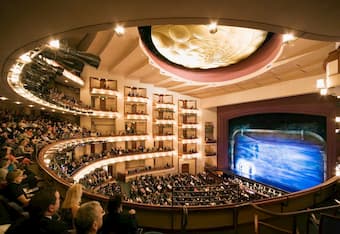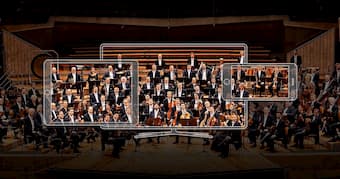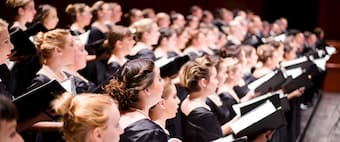
Adrienne Arsht Center © www.glassdoor.com.au
Can you experience cultural enrichment in a virtual world?
Another way of looking at this question is if our foremost experience of culture had always been gleaned digitally, would it be a lesser one?
COVID-19 has vastly changed our cultural world, especially our interactions with live performance. Even if you have a high-quality audio system, the digital concert hall experience is not the same as being there. The warmth, the interface with audience members and the ambient sounds you get from seeing and hearing humans live is vastly better than any digital experience I’ve ever had.
In the mid-1980s, I was lucky enough to hear the Moscow State Symphony Orchestra (MSSO) perform live in The Sydney Opera House. It was an ethereal experience. I can still remember what some of the players looked like, and the reaction from the audience, but their sound was monumental and profound; it still rings in my ears. Here is the MSSO at the Adrienne Arsht Center for the Performing Arts in Miami, Florida, USA, playing the first movement of Beethoven’s Symphony No. 6. If I’d only ever heard the MSSO on the radio or digitally, would I remember it the same? The answer is an emphatic no.
You can see and hear how well trained and complete they are as an orchestra, but can you feel it? In the virtual world, you don’t get to breathe in the musical expirations of an orchestra. Very few virtual experiences take in the dimensions and beauty of the concert halls orchestras perform in. While I’ve never been to the Adrienne Arsht Center for the Performing Arts in Miami, it looks like a place that would leave a joyful memory.

© Berliner Philharmoniker digital concert hall
Even with live-streamed gigs due to COVID-19, there is a lot missing from attending a concert. The Digital Concert Hall that the Berliner Philharmoniker has set up is probably the best in the world. Australia has the Melbourne Digital Concert Hall. There are other digital spaces around the world, but maybe none as good as these two. There are benefits for a digital concert space, such as it keeps musicians playing and being paid.
However, do they give you what you want? Do they enrich a digital cultural life? Do you get that kick in the guts, foot-stomping, hair raising on the back of the neck experience that you get with many live concert performances? I don’t.
If we are unable to find a cure for COVID-19, are we always to have our cultural life the way it is now? Imagine if we cannot get back into concert halls to hear the thousand years of art music that the world has created, and we love dearly. Imagine never being able to hear and see Beethoven 9 again.
It looks like massed choirs for this Beethoven masterpiece are out for the foreseeable future. With wind bands and choral music, how are the players and the audience going to be protected from this virus that has already killed over one million people? It looks like as much as I and others do not fully enjoy a digital cultural life, it’s all we will have for some time.

Massed choirs for Beethoven 9 are probably out for the foreseeable future
© New Jersey Symphony Orchestra
What will happen to all the performance awards around the world? How can we give out awards and encouragement to something that does not exist?
Opera companies are perhaps hit harder that other arts establishments during this pandemic. The redundancies at Opera Australia alone have hit their singers and the orchestra hard. What is this going to do to future generations of singers and players across the concert and opera world? Well, it’s already doing it. It’s wreaking havoc. Players and singers are not just thrown out of work, as this is their career and no one is employing only letting go, do they have to retrain and begin anew?
As art lovers, a digital cultural life is one thing, but for art makers, it is their life. It is their livelihood. I have never met one player or singer who did not love what they do. That can rarely be said for other occupations because we all know that art-making is not an occupation, it’s a lifestyle and a life choice. Our cultural lives have been disturbed, for the makers of our cultural world, it has been destroyed.
I and many others are yelling out for our concert halls to be filled again. But we are not the ones who have to deal with the ramifications of a Coronavirus infection upon another audience or staff member. We can walk out of a concert hall, players, technicians, and management cannot, that’s where they live.
For now, I hope that the creators of our digital cultural life will do all they can to bring us the best quality experience possible. One good thing about this pandemic is we are getting to hear more ensemble music because the risk of infection for ensemble players is not as great as orchestral players. We just have to wait and be happy with what we have. This pandemic may have amazing results for the music world once it’s over. I know so many artists are making so much music and instrument sales have never been as strong.
I’d like to leave you with a memory of just how good a real concert experience is, with kissing and handshaking, and no social distancing. Rachmaninoff’s Piano Concerto no.2, with Anna Fedorova at the piano and the Nordwestdeutsche Philharmonie led by Martin Panteleev.




